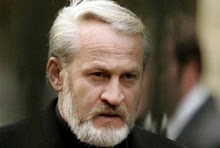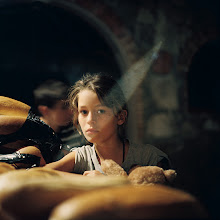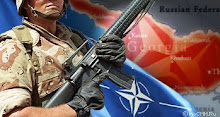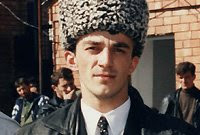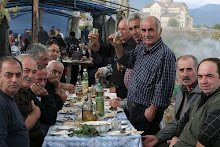Caucasus House
Caucasus House is the first organization and think-tank in
Questions for Akhmed Zakaev
Poll of the day: What will be the impact of the Russian-Georgian war for the Caucasus region in 2009?
Friday, December 5, 2008
New Documentary Film: Crying Sun, The Impact of War in Mountains of Chechnya
Wednesday, December 3, 2008
Russian Journalist Aleksey Venedikov on Russian-Georgian War
Abkhazia: Frozen Conflict?
 A Broken Bridge and Two Separate Banks
A Broken Bridge and Two Separate Banksby Mirian Jugheli
All my short life, I remember conversations and discussions about the conflict in Abkhazia. I don’t remember the war, but I do remember the endless talk about its causes and consequences. I also remember the pain in the eyes of the thousands who had to leave their land. Some were happy just to have survived, but others left behind the remains of their beloved, never knowing if they would be able to go back and bury them.
My memory of the war goes back to my grandmother who lived in Gagra all her life. She loved playing the piano and singing a song in a Tango rhythm, (we called it her Gagra hymn) of "Oh, sea in Gagra, Oh, palms in Gagra, who sees this once will never forget.’’
Keep reading
Monday, December 1, 2008
Special Report: Total destruction of Georgian villages in South Ossetia
 Russian journalist Oleg Panfilov forwarded photo materials from the Georgian separatist enclave of South Ossetia, where dozens of Georgian villages were intentionally destroyed, looted and burned by the Ossetian militants and their Russian allies during the Russian-Georgian War in August of 2008. The above photograph depicts the village of Tamarasheni, which has been totaly destroyed and bouldozed by the Ossetians, determined to eradicate all Georgian enclaves within the separatist region. See more photographs of the devastated Georgian villages of Eredvi, Nuli, Psiri.
Russian journalist Oleg Panfilov forwarded photo materials from the Georgian separatist enclave of South Ossetia, where dozens of Georgian villages were intentionally destroyed, looted and burned by the Ossetian militants and their Russian allies during the Russian-Georgian War in August of 2008. The above photograph depicts the village of Tamarasheni, which has been totaly destroyed and bouldozed by the Ossetians, determined to eradicate all Georgian enclaves within the separatist region. See more photographs of the devastated Georgian villages of Eredvi, Nuli, Psiri.
Questions for Akhmed Zakaev
Nagorno Karabakh: Progress Towards Peace?

Following much speculation surrounding a long anticipated breakthrough in negotiations between Armenia and Azerbaijan to agree upon a peace agreement to end the conflict over Nagorno Karabakh, Armenian President Serge Sargsyan convened a meeting with political forces behind closed doors to discuss recent developments. Despite demanding disclosure of the recent talks in Moscow as well as in Madrid last year, RFE/RL reports that representatives of most of the major parties making up the radical opposition led by former president Levon
Keep reading
Sokolov is the New Sakharov
 Professor is Fired for Writing about Saakashvili
Professor is Fired for Writing about Saakashviliby Olga Gorelik
Over the past month, the historian Boris Sokolov has lost his job not once but twice. First, he was suspended from his position as an op-ed columnist for the Gazeta newspaper. Then his resignation was demanded from his other employer, the Russian State Social University (”RSSU”). Both incidents were the result of a column Sokolov wrote for Gazeta in August entitled “Did Saakashvili Win or Lose?” in which he questioned the Kremlin’s version of the events in South Ossetia.
The August War: From Political Confrontation to Military Escalation
 By Bruno Coppieters
By Bruno CoppietersThe August 2008 war between Russia and Georgia has altered our perception of European security. For the first time since the dissolution of the Soviet Union, Russia used massive military force outside its borders. According to a broadly accepted interpretation of events, Russia wanted to influence discussions within the NATO alliance on a Membership Action Plan (MAP) for Georgia and Ukraine. Russia’s “disproportional” response to Georgia’s use of force against South Ossetia demonstrated that the full integration of Tbilisi into the Atlantic alliance would carry a number of serious costs. Another reading of events, which focuses more on intra-state conflicts in Georgia and various parties’ use of confrontation policies, has received less attention.
Russia's treatment of its republics in the Caucasus has turned them into tinderboxes
 From The Economist
From The Economist"I DESIRE that the terror of my name should guard our frontiers more potently than chains or fortresses, that my word should be for the natives a law more inevitable than death," wrote Alexei Yermolov, Russia's legendary general who waged total war during his conquest of the north Caucasus in the early 19th century. A hero of the Napoleonic wars revered by Russian romantics, Yermolov is still universally hated by "the natives" who think of him as brutal, contemptuous and genocidal. In the late Soviet period his statue in Chechnya was regularly blown up until it was eventually thrown into the river.
Keep reading
